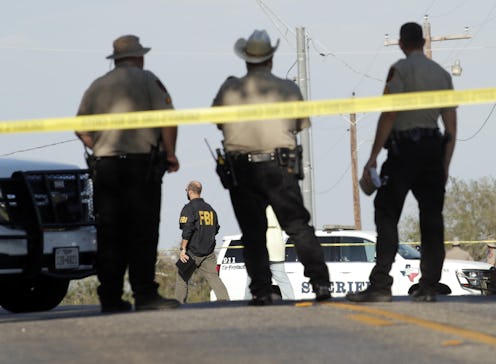
At least 26 people have been killed after a gunman opened fire at a small Baptist church in Sutherland Springs, Texas, on Sunday. The tragedy has been billed as the largest mass shooting in the southern state's modern history. But as details begin to surface about the tragedy, it's imperative to double check where information comes from, especially on viral social media posts. Just hours after the Sutherland Springs church shooting, many hoaxes began circulating on the internet, spreading false information about the day's events.
Oftentimes, the hoaxes misidentified the shooter, or else misattributed the shooting to various groups of people. By and large, these posts and memes have no grounding in facts of any kind, but are either sick "jokes" or conspiracy-theory based propaganda.
Not only is spreading false reports entirely unhelpful, it can also be harmful. In some cases, specific individuals have had their names dragged through tweets and Facebook posts, alleging that they had been killed. In other instances, blaming the shooting on specific groups of people has been used to stoke fear and panic, as well as to bolster some specific political agenda. These lies do a disservice to those who were harmed, and they distract from meaningful discussions that could help prevent tragedies like in Sutherland Springs from happening again.
"Sam Hyde" Meme
Rep. Vicente Gonzalez said on CNN that the shooter was identified as Sam Hyde. Hyde, however, is an alt-right comedian and internet personality. As part of an ongoing meme, he is often identified as the perpetrator of many violent tragedies.
"It was reported to me that [the shooter is] actually not from this community," Rep. Gonzalez said on CNN. "Apparently, his name was released as 'Sam Hyde.' That's the name I was given."
This hoax has been going on for years.
Shooter Is Not "Chris Ward"
One rumor to circulate in the aftermath of the shooting was that a Texas resident named Chris Ward was the shooter. Multiple family members, including a person identified as Ward's aunt, took to Facebook to dispel the rumors.
According to multiple reports, Ward's wife and children were among the victims.
This YouTuber Isn't a Victim
Another meme that made the rounds falsely claimed that this person, YouTuber "Reviewbrah," was among the victims of Sunday's attack. However, like Hyde, Reviewbrah has been touted as a victim at several incidents of mass violence.
Attributing A Religion To The Shooter
One popular hoax that spread claimed that the shooter was a recent convert to Islam. However, this claim has no grounding in fact and appears to simply be yet another attempt to ignite political outrage and Islamophobia.
Claims Shooter Was A Democrat
Similarly, claims that the shooter was a Democrat also circulated. There has been no factual evidence reported that indicates whether the shooter was part of any political group, let alone that he planned the shooting as part of any specific political statement.
Claims Shooter Was A Republican
Particularly on Twitter, claims that the shooter was a Republican and that this was somehow related to his actions circulated on social media Sunday night. Again, this has no backing or credibility as of Sunday night.
Shooter Described As "Antifa" Member
Screenshots purporting to be of the shooter's Facebook page spread rapidly across social media platforms. Based on pages the account's user allegedly followed, many users reported that the shooter was a member of the vigilante anti-fascist group "Antifa." However, like the rest of the shooter's supposed affiliations, this has not been proven but has been circulated to push a political perspective.
Recent Convert To Islam Named "Samir al-Hajeed"
Another popular hoax that rears its head after mass tragedies is that the perpetrator was a recent convert to Islam who changed his name to either Samir al-Hajeed or Samir al-Hajib. Again, a simple search of either of those names provides ample evidence that this is not the case — and that this lie is not even original. Instead, it's used by outlets and individuals to promote Islamophobia.
These Internet hoaxes were designed, largely, to misinform the public and to increase tensions among different political groups. But the reality of the situation is that more than two dozen people lost their lives on Sunday, and sharing the false information in these posts is insulting to the victims and their families.